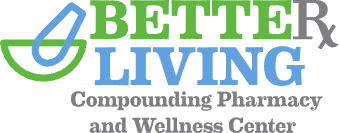Thyroid Management

Are You on a Thyroid Medication but You Still Don’t Feel Your Best? Do You Know Your Thyroid Levels? Has Your Doctor Talked to You About Reverse T3 Dominance?
Better Living Medical has the capability to compound unique thyroid doses for each individual patient. We work closely with physicians in the area in order to interpret blood work, recommend thyroid compound dosing, If you feel that you may have thyroid issues, we invite you to ask our pharmacist for effective recommendations to help support your thyroid function.
The thyroid gland serves as the fuel center of the body, and governs the production of energy in every cell of our body. Low thyroid function, or hypothyroidism, is a condition in which the thyroid is not producing sufficient quantities of thyroid hormones. Hashimoto’s thyroiditis is the most common form of hypothyroidism, and is thought to be an autoimmune condition. In the past, low consumption of iodine was thought to be the main cause of hypothyroidism. Today, iodized table salt helps to reduce the incidence of iodine deficiency. A kelp supplement which contains iodine is commonly used when individuals do not consume adequate seafood or iodized salt. Hypothyroidism is more prevalent in women than men, and hormonal imbalances can also affect thyroid function. Hyperthyroidism, or Grave’s disease, is a condition in which the thyroid function is over active and it is also thought to be an autoimmune condition.
The symptoms of hypothyroidism can include:
Fatigue
dry skin
Constipation
Hoarseness
thinning hair
brittle nails
weight gain
memory loss
cold hands and feet
intolerance to cold
There is also a direct link between adrenal health and thyroid function. Daily stress and adrenal fatigue can have an adverse effect on thyroid function and overall energy levels. That is why treatment of thyroid dysfunction often involves utilizing herbal substances called adaptogens, which help to support the adrenal gland. By supporting the function of the adrenal gland, the thyroid gland also is better able to perform its function.
The main hormones produced by the thyroid are T-4 (levothyroxine) and T-3 (liothyronine). Key to proper thyroid function is the conversion of T-4 to the more active T-3 form. There are several nutrients such as zinc and selenium which help to encourage the conversion from T-4 to T-3.
Reverse T3 dominance, also known as Wilson’s Syndrome, is a condition that exhibits most hypothyroid symptoms although circulating levels of T3 and T4 are within normal test limits. The metabolism of T4 into rT3 is in excess when compared to T3 therefore it is a T4 metabolism malfunction rather than a straight forward thyroid deficiency. Periods of prolonged stress may cause an increase in cortisol levels as the adrenal glands respond to the stress.

The high cortisol levels inhibit the 5-deiodinase enzyme Type 1 and thus the conversion of T4 into T3 thus reducing active T3 levels. The conversion of T4 is then shunted towards the production of the inactive rT3 via the 5-deiodinase enzyme Type 3. This rT3 dominance may persist even after the stress passes and cortisol levels have returned to normal as the rT3:T3 imbalance itself may also inhibit the 5-deiodinase enzyme Type 1 thus perpetuating the production of the inactive rT3 isomer. There is some argument to this last point with some research indicating that the elevated rT3 is only temporary and not a permanent condition and in most healthy people this may well be the case. We have however found that in many patients suffering from a range of hypothyroid symptoms do indeed have prolonged elevated rT3 levels which respond favorably to this treatment.
Many medical practitioners do not accept rT3 dominance theory and thus many doctors will refuse to treat this condition despite the fact many suffers have been successfully treated.
Other causes of reverse T3 dominance include:
- Leptin resistance, inflammation (NF kappa-B)
- Dieting
- Nutrient deficiencies such as low iron, selenium, zinc, chromium, Vit B6 and B12, Vit D and iodine
- Low testosterone
- Low human growth hormone
- Insulin dependent Diabetes
- Pain
- Stress
- Environmental toxins
- Free radical load
- Hemorrhagic shock
- Liver disease
- Kidney disease
- Severe or systemic illness
- Severe injury
- Surgery
- Toxic metal exposure
